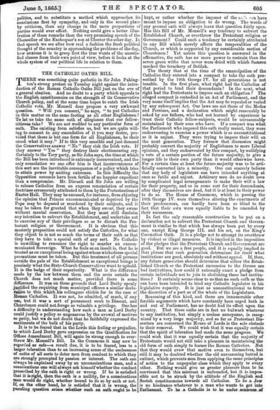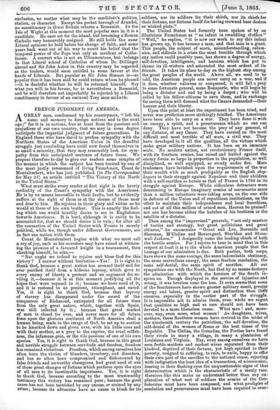THE CATHOLIC OATHS BILL.
filHERE was something quite pathetic in Sir John Peking- ton's strong protest on Tuesday night against the intro- duction of the Boman Catholic Oaths Bill just on the eve of a general election. And no doubt to a party which appeals to the English. constituencies on the strength of its Conservative Church policy,- and at the same time hopes to catch the Irish Catholic vote, Mr. Monsell does propose a very awkward question. " Will you consent," he says, " to put Catholics in this matter on the same footing as all other, ,Englishmen ? To let us take the same oath of allegiance that our fellow- citizeno,take ? We are not wedded to any particular form of oath. The existing form satisfies us, but we are quite will- ing to consent to .any emendation of it you may desire, pro- vided that there is but one form for all Englishmen, be their creed what it may." If to this very sensible and just demand the Conservatives answer "No " they risk the Irish vote. If they answer " Yes " they destroy their electioneering cry. Certainly to the Tory party, as Sir John says, the time at which the BiU has been introduced is extremely inconvenient, and the only consolation we can offer him is that inconveniences of this sort are the inevitable consequence of a policy which tries to attain power by uniting extremes. In this difficulty the Opposition counsels have been fertile of no happier expedient than a compromise. Mr. Disraeli and Sir John are willing to release Catholics from an express renunciation of certain doctrines erroneously attributed to them by the Protestantism of Exeter Hall. They may be excused, for instance, from abjuring the opinion that Princes excommunicated or deprived by the Pope may be deposed or murdered by their subjects, and it may be taken for granted that when they swear, they swear without mental reservation. But they must still disclaim any intention to subvert the Establishment, and undertake not to exercise any of their privileges so as to disturb the Pro- testant .religion or Government. It is obvious that this masterly proposition could not satisfy the Catholics, for what they object to is not so much the terms of their oath' as that they have to take a special oath of any sort. No Catholic is unwilling to renounce the right to murder an excom- municated Sovereign. What he feels as an insult is, that he is treated as an exceptional being against whose wickedness special precautions must be taken. But this treatment of all persons outside the pale of the Establishment as exceptional beings is precisely what the State-Church Conservatives want to uphold. It is the badge of their superiority. What is the difference made by the law between them and the sects outside the Church does not much matter, provided there is some difference. It was, on these grounds that Lord Derby openly jastified the requiring from municipal officers a similar decla- ration to this which. his colleagues stickle for in the case of Roman Catholics, 4 was not, he admitted, of much, if any use, but it was a sort of permanent snub to Dissent, and Churchmen could not forego so valuable a privilege. One has a difficulty in understanding how such a man as Lord Derby could justify a policy so ungenerous by the avowal of motives so petty, but we do not doubt that he faithfully expressed the sentiments of the bulk of his party. It is to be feared that in the Lords this feeling or prejudice, to which Lord Derby gave expression on the Qualification for Offices Amendment Bill, will again be strong enough to over- throw Mr. Monsell's Bill. In the Commons it may now be regarded as safe—a result due, it is to be feared, less to a larger toleration than to an increasing sense of the uselessness of oaths of all sorts to deter men from conduct to which they are strongly prompted by passion or interest. The oath can always be explained away by an unconscientious man, and a conscientious one will always ask himself whether the conduct prescribed by the oath is right or wrong. If he is satisfied that it is right, then the oath is a nullity, for a conscientious man would do right, whether bound to do so by oath or not. ' If, on the other hand, he is satisfied that it is wrong, the puzzling question arises whether such an oath ought to be kept, or rather whether the imposer of the call). can have meant to impose an obligation to do wrong. The words of any general oath will always leave that question fairly open. Has this Bill of Mr. Monsell's any tendency to subvert the Established Church, or overthrow the Protestant religion or Government ? Could such a tendency be certainly attributed to any Bill which merely affects the temporalities of the Church, or which is supported by any considerable section of Churchmen ? Yet unless this question is answered is the affirmative, the oath has no more power to restrain than the seven green withs that never were dried with which Samson mocked the treachery of Delilah.
The theory that at the time of the emancipation of the Catholics they entered into a compact to take the oath pre- scribed by the 10th George IV. for all generations is not tenable. In the first place, what right had the Catholics of that period to bind their descendants ? In the next, what right had the Protestants to impose such an obligation ? The alleged compact is embodied in an Act of Parliament, and the very name itself implies that the Act may be repealed or varied by any subsequent Act. Our laws are not those of the Medea and Persians, and a declaration which might reasonably be Asked by our fathers, who had not learned by experience to trust their Catholic fellow-subjects, would be unreasonably -maintained by their eons who have. If a compact was what the Parliament who imposed this oath really meant, they were endeavouring to exercise a power which is as unconstitutional as it is unjust. They were trying to impose their will on the next generation. They foresaw that discussion might probably convert the majority of Englishmen to more Liberal opinions, and they endeavoured by this compact, by nullifying a vote of a certain portion of the future majority, to give a longer life to their own party than it would otherwise have. For a certain time at least the future majority was to be arti- ficially converted into a minority. One can scarcely believe that any body of legislators can have intended anything at once so futile and unjust. Arbitrary men do no doubt love by complicated legal arrangements to make their will a law for their property, and so in some sort for their descendants, after they themselves are dead, but it is at least in their power to do so. The House of Commons, which in passing •the 10th George IV. were themselves altering the enactments of their predecessors, can hardly have been so blind to the fact that their own were equally liable to be amended by their successors.
In fact the only reasonable construction to be put on a declaration not to subvert the Protestant Church and Govern- ment is -similar to that which has always been put by every one, except King George III. and his set, on the 'King's Correlation -Oath. It is a pledge not to attempt its overthrow by violent or illegal measures. It is implied in the imposition of the pledges that the Protestant Church and Government are good. But we are a free people, and it is equally implied in that phrase that each generation determines for itself what institutions are good, absolutely and without appeal. If, then, any future generation should determine that either the Estab- lished Church or the Protestant succession to the throne are bad institutions, how could it rationally exact a pledge from certain individuals not to join in abolishing these bad institu- tions ? It certainly seems clear to us that no such oath as this can have been intended to bind any Catholic legislator in his legislative capacity. It.is just as unconstitutional to fetter the discretion of a part as of the whole of the Legislature. Reasoning of this kind, and there are innumerable other forcible arguments which have constantly been urged both in and out of Parliament, has no doubt had its effect upon ,the country. That these oaths are in fact no bulwark whatever to any institution, but simply a useless annoyance, is recog- nized by a very large majority, and so far as -Protestant Dis- senters are concerned the House of Lords is the sole obstacle to their removal. We could wish that it was-equally certain- that the spirit of toleration had made the same progress. We could wish that it was equally certain that the majority of Protestants would not still take a pleasure in maintaining the old form of oath simply to harass the Roman Catholics. Nat that they would avow that motive even to themselves, but still it may be doubted whether the old unreasoning hatredis extinct, which prevents men from applying the same principles of action to the unpopular class which they apply to every other. Nothing would give us greater pleasure than to be. convinced that this mistrust is unfounded, but it is impos- sible not to be struck by the attitude of the English and Scotch constituencies towards all Catholics. To be A Jew is no hindrance whatever to a man who wants to get into. Parliament. To be a Catholic is to be under :senione04‘
exclusion, no matter what may be the candidate's politics, station, or character. Except the pocket borough of Arundel, no constituency in Great Britain returns a Romanist. In the Isle of Wight at this moment the most popular man in it is a candidate. He once sat for the island, but becoming a Roman Catholic very honourably resigned. He still holds the same Liberal opinions he held before his change of faith, and some years back went out of his way to assert his belief that the temporal power of the Pope was only an accident of Catho- licism. A convert who is not an Ultramontane, but belongs to that Liberal school of Catholics of whom Dr. Dellinger abroad and Sir John Acton in this country may be regarded as the leaders, would seem entitled to some favour at the hands of Liberals. But popular as Sir John Simeon is—so popular that it has been said he could return whom he pleased —it is doubtful whether he will be returned himself. Say what you will in his favour, he is nevertheless a Romanist, and he will therefore not improbably be rejected by a Liberal constituency in favour of an eminent Tory man•midwife.































 Previous page
Previous page